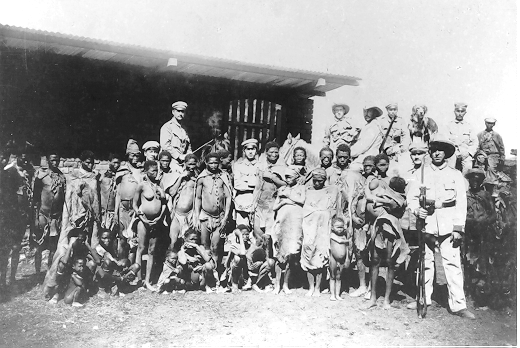


O C C U P A T I O N O V E R V I E W
The unification of Germany in 1871 greatly impacted their colonial empire, as they were late to unify and thus late to the negotiating table when splitting up Africa. Many Germans at the time viewed colonization as a sign of a strong nation, but Otto von Bismarck, the Chancellor of Germany from 1862-1890, opposed the idea and wanted to shift the focus of the German people on securing Germany’s place in their home continent first. He eventually succumbed to public opinion and in the 1883, Germany joined Europe’s “Scramble for Africa.” German occupation of Africa was split largely into three parts: Southwest, East, and West Africa, which stayed under German control until their defeat in World War I. This resulted in Germany being stripped of its colonial empire at the Paris Peace Conference in 1919.
S O U T H W E S T A F R I C A:
The German occupation of South West Africa began in 1884, when German merchant Franz Adolf Lüderitz created a trading post he later named Lüderitzbucht. Soon after, he acquired a coastal area nearby, which he named Lüderitzland. Germany declared the areas to be under German protection in that year.
Major Theodor Leutwein was named governor, and remained governor until 1904. Governor Leutwein successfully suppressed rebellions from the Khoekhoes and the Hereros in the 1890s.
In 1904, the Hereros formed a battalion of 8000 men to rebel against the German rule in what is now known as the Battle of Waterberg. Reinforcement from German General Lothar von Trotha is what ultimately sealed the fate of the Hereros.
O T H E R A R E A S I N A F R I C A:
East Africa:
The Germans occupied a few areas in eastern Africa from the 1880s-1920. These include Ruanda-Urundi from 1885-1917, which became present day Rwanda and Burundi, as well as Wituland from 1885-1890, which became present day Kenya.
West Africa:
German West Africa only existed for a span of two years, then split due to the distance between the two. Both areas were under German control from 1884-1919. Kamerun became present day Cameroon, and Togoland separated into British-occupied Ghana and French-occupied Togo.
T R E A T M E N T O F E N S L A V E D
P E O P L E S B Y T H E G E R M A N S:
While the summer of 1904 saw continued warfare between the Germans and the Hereros, General von Tratha set a plan in place to put an end to the fighting. After surrounding the Hereros with his German forces, the Hereros were left no choice but to flee into the desert. General von Tratha issues an extermination order to get rid of the remaining Hereros by whatever means necessary.
Men, women, children, and the elderly who gave themselves up to the Germans were met with false promises and were ultimately enslaved in the first concentration camps known in the 20th century. Located in German port towns, the remaining Herero faced starvation, neglect, and bad living conditions, leading to the death of thousands.